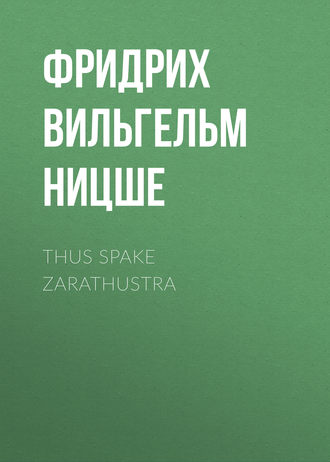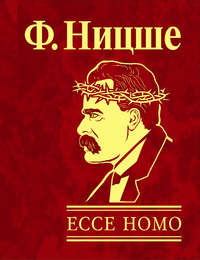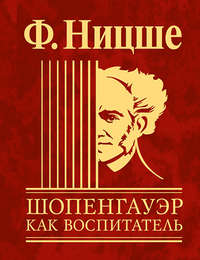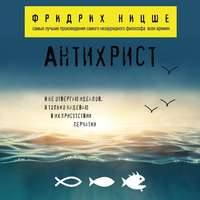 полная версия
полная версияThus Spake Zarathustra
Well! This is my sermon for THEIR ears: I am Zarathustra the godless, who saith: “Who is more godless than I, that I may enjoy his teaching?”
I am Zarathustra the godless: where do I find mine equal? And all those are mine equals who give unto themselves their Will, and divest themselves of all submission.
I am Zarathustra the godless! I cook every chance in MY pot. And only when it hath been quite cooked do I welcome it as MY food.
And verily, many a chance came imperiously unto me: but still more imperiously did my WILL speak unto it, – then did it lie imploringly upon its knees —
– Imploring that it might find home and heart with me, and saying flatteringly: “See, O Zarathustra, how friend only cometh unto friend!” —
But why talk I, when no one hath MINE ears! And so will I shout it out unto all the winds:
Ye ever become smaller, ye small people! Ye crumble away, ye comfortable ones! Ye will yet perish —
– By your many small virtues, by your many small omissions, and by your many small submissions!
Too tender, too yielding: so is your soil! But for a tree to become GREAT, it seeketh to twine hard roots around hard rocks!
Also what ye omit weaveth at the web of all the human future; even your naught is a cobweb, and a spider that liveth on the blood of the future.
And when ye take, then is it like stealing, ye small virtuous ones; but even among knaves HONOUR saith that “one shall only steal when one cannot rob.”
“It giveth itself” – that is also a doctrine of submission. But I say unto you, ye comfortable ones, that IT TAKETH TO ITSELF, and will ever take more and more from you!
Ah, that ye would renounce all HALF-willing, and would decide for idleness as ye decide for action!
Ah, that ye understood my word: “Do ever what ye will – but first be such as CAN WILL.
Love ever your neighbour as yourselves – but first be such as LOVE THEMSELVES —
– Such as love with great love, such as love with great contempt!” Thus speaketh Zarathustra the godless. —
But why talk I, when no one hath MINE ears! It is still an hour too early for me here.
Mine own forerunner am I among this people, mine own cockcrow in dark lanes.
But THEIR hour cometh! And there cometh also mine! Hourly do they become smaller, poorer, unfruitfuller, – poor herbs! poor earth!
And SOON shall they stand before me like dry grass and prairie, and verily, weary of themselves – and panting for FIRE, more than for water!
O blessed hour of the lightning! O mystery before noontide! – Running fires will I one day make of them, and heralds with flaming tongues: —
– Herald shall they one day with flaming tongues: It cometh, it is nigh, THE GREAT NOONTIDE!
Thus spake Zarathustra.
L. ON THE OLIVE-MOUNT
Winter, a bad guest, sitteth with me at home; blue are my hands with his friendly hand-shaking.
I honour him, that bad guest, but gladly leave him alone. Gladly do I run away from him; and when one runneth WELL, then one escapeth him!
With warm feet and warm thoughts do I run where the wind is calm – to the sunny corner of mine olive-mount.
There do I laugh at my stern guest, and am still fond of him; because he cleareth my house of flies, and quieteth many little noises.
For he suffereth it not if a gnat wanteth to buzz, or even two of them; also the lanes maketh he lonesome, so that the moonlight is afraid there at night.
A hard guest is he, – but I honour him, and do not worship, like the tenderlings, the pot-bellied fire-idol.
Better even a little teeth-chattering than idol-adoration! – so willeth my nature. And especially have I a grudge against all ardent, steaming, steamy fire-idols.
Him whom I love, I love better in winter than in summer; better do I now mock at mine enemies, and more heartily, when winter sitteth in my house.
Heartily, verily, even when I CREEP into bed – : there, still laugheth and wantoneth my hidden happiness; even my deceptive dream laugheth.
I, a – creeper? Never in my life did I creep before the powerful; and if ever I lied, then did I lie out of love. Therefore am I glad even in my winter-bed.
A poor bed warmeth me more than a rich one, for I am jealous of my poverty. And in winter she is most faithful unto me.
With a wickedness do I begin every day: I mock at the winter with a cold bath: on that account grumbleth my stern house-mate.
Also do I like to tickle him with a wax-taper, that he may finally let the heavens emerge from ashy-grey twilight.
For especially wicked am I in the morning: at the early hour when the pail rattleth at the well, and horses neigh warmly in grey lanes: —
Impatiently do I then wait, that the clear sky may finally dawn for me, the snow-bearded winter-sky, the hoary one, the white-head, —
– The winter-sky, the silent winter-sky, which often stifleth even its sun!
Did I perhaps learn from it the long clear silence? Or did it learn it from me? Or hath each of us devised it himself?
Of all good things the origin is a thousandfold, – all good roguish things spring into existence for joy: how could they always do so – for once only!
A good roguish thing is also the long silence, and to look, like the winter-sky, out of a clear, round-eyed countenance: —
– Like it to stifle one’s sun, and one’s inflexible solar will: verily, this art and this winter-roguishness have I learnt WELL!
My best-loved wickedness and art is it, that my silence hath learned not to betray itself by silence.
Clattering with diction and dice, I outwit the solemn assistants: all those stern watchers, shall my will and purpose elude.
That no one might see down into my depth and into mine ultimate will – for that purpose did I devise the long clear silence.
Many a shrewd one did I find: he veiled his countenance and made his water muddy, that no one might see therethrough and thereunder.
But precisely unto him came the shrewder distrusters and nut-crackers: precisely from him did they fish his best-concealed fish!
But the clear, the honest, the transparent – these are for me the wisest silent ones: in them, so PROFOUND is the depth that even the clearest water doth not – betray it. —
Thou snow-bearded, silent, winter-sky, thou round-eyed whitehead above me! Oh, thou heavenly simile of my soul and its wantonness!
And MUST I not conceal myself like one who hath swallowed gold – lest my soul should be ripped up?
MUST I not wear stilts, that they may OVERLOOK my long legs – all those enviers and injurers around me?
Those dingy, fire-warmed, used-up, green-tinted, ill-natured souls – how COULD their envy endure my happiness!
Thus do I show them only the ice and winter of my peaks – and NOT that my mountain windeth all the solar girdles around it!
They hear only the whistling of my winter-storms: and know NOT that I also travel over warm seas, like longing, heavy, hot south-winds.
They commiserate also my accidents and chances: – but MY word saith: “Suffer the chance to come unto me: innocent is it as a little child!”
How COULD they endure my happiness, if I did not put around it accidents, and winter-privations, and bear-skin caps, and enmantling snowflakes!
– If I did not myself commiserate their PITY, the pity of those enviers and injurers!
– If I did not myself sigh before them, and chatter with cold, and patiently LET myself be swathed in their pity!
This is the wise waggish-will and good-will of my soul, that it CONCEALETH NOT its winters and glacial storms; it concealeth not its chilblains either.
To one man, lonesomeness is the flight of the sick one; to another, it is the flight FROM the sick ones.
Let them HEAR me chattering and sighing with winter-cold, all those poor squinting knaves around me! With such sighing and chattering do I flee from their heated rooms.
Let them sympathise with me and sigh with me on account of my chilblains: “At the ice of knowledge will he yet FREEZE TO DEATH!” – so they mourn.
Meanwhile do I run with warm feet hither and thither on mine olive-mount: in the sunny corner of mine olive-mount do I sing, and mock at all pity. —
Thus sang Zarathustra.
LI. ON PASSING-BY
Thus slowly wandering through many peoples and divers cities, did Zarathustra return by round-about roads to his mountains and his cave. And behold, thereby came he unawares also to the gate of the GREAT CITY. Here, however, a foaming fool, with extended hands, sprang forward to him and stood in his way. It was the same fool whom the people called “the ape of Zarathustra:” for he had learned from him something of the expression and modulation of language, and perhaps liked also to borrow from the store of his wisdom. And the fool talked thus to Zarathustra:
O Zarathustra, here is the great city: here hast thou nothing to seek and everything to lose.
Why wouldst thou wade through this mire? Have pity upon thy foot! Spit rather on the gate of the city, and – turn back!
Here is the hell for anchorites’ thoughts: here are great thoughts seethed alive and boiled small.
Here do all great sentiments decay: here may only rattle-boned sensations rattle!
Smellest thou not already the shambles and cookshops of the spirit? Steameth not this city with the fumes of slaughtered spirit?
Seest thou not the souls hanging like limp dirty rags? – And they make newspapers also out of these rags!
Hearest thou not how spirit hath here become a verbal game? Loathsome verbal swill doth it vomit forth! – And they make newspapers also out of this verbal swill.
They hound one another, and know not whither! They inflame one another, and know not why! They tinkle with their pinchbeck, they jingle with their gold.
They are cold, and seek warmth from distilled waters: they are inflamed, and seek coolness from frozen spirits; they are all sick and sore through public opinion.
All lusts and vices are here at home; but here there are also the virtuous; there is much appointable appointed virtue: —
Much appointable virtue with scribe-fingers, and hardy sitting-flesh and waiting-flesh, blessed with small breast-stars, and padded, haunchless daughters.
There is here also much piety, and much faithful spittle-licking and spittle-backing, before the God of Hosts.
“From on high,” drippeth the star, and the gracious spittle; for the high, longeth every starless bosom.
The moon hath its court, and the court hath its moon-calves: unto all, however, that cometh from the court do the mendicant people pray, and all appointable mendicant virtues.
“I serve, thou servest, we serve” – so prayeth all appointable virtue to the prince: that the merited star may at last stick on the slender breast!
But the moon still revolveth around all that is earthly: so revolveth also the prince around what is earthliest of all – that, however, is the gold of the shopman.
The God of the Hosts of war is not the God of the golden bar; the prince proposeth, but the shopman – disposeth!
By all that is luminous and strong and good in thee, O Zarathustra! Spit on this city of shopmen and return back!
Here floweth all blood putridly and tepidly and frothily through all veins: spit on the great city, which is the great slum where all the scum frotheth together!
Spit on the city of compressed souls and slender breasts, of pointed eyes and sticky fingers —
– On the city of the obtrusive, the brazen-faced, the pen-demagogues and tongue-demagogues, the overheated ambitious: —
Where everything maimed, ill-famed, lustful, untrustful, over-mellow, sickly-yellow and seditious, festereth pernicious: —
– Spit on the great city and turn back! —
Here, however, did Zarathustra interrupt the foaming fool, and shut his mouth. —
Stop this at once! called out Zarathustra, long have thy speech and thy species disgusted me!
Why didst thou live so long by the swamp, that thou thyself hadst to become a frog and a toad?
Floweth there not a tainted, frothy, swamp-blood in thine own veins, when thou hast thus learned to croak and revile?
Why wentest thou not into the forest? Or why didst thou not till the ground? Is the sea not full of green islands?
I despise thy contempt; and when thou warnedst me – why didst thou not warn thyself?
Out of love alone shall my contempt and my warning bird take wing; but not out of the swamp! —
They call thee mine ape, thou foaming fool: but I call thee my grunting-pig, – by thy grunting, thou spoilest even my praise of folly.
What was it that first made thee grunt? Because no one sufficiently FLATTERED thee: – therefore didst thou seat thyself beside this filth, that thou mightest have cause for much grunting, —
– That thou mightest have cause for much VENGEANCE! For vengeance, thou vain fool, is all thy foaming; I have divined thee well!
But thy fools’-word injureth ME, even when thou art right! And even if Zarathustra’s word WERE a hundred times justified, thou wouldst ever – DO wrong with my word!
Thus spake Zarathustra. Then did he look on the great city and sighed, and was long silent. At last he spake thus:
I loathe also this great city, and not only this fool. Here and there – there is nothing to better, nothing to worsen.
Woe to this great city! – And I would that I already saw the pillar of fire in which it will be consumed!
For such pillars of fire must precede the great noontide. But this hath its time and its own fate. —
This precept, however, give I unto thee, in parting, thou fool: Where one can no longer love, there should one – PASS BY! —
Thus spake Zarathustra, and passed by the fool and the great city.
LII. THE APOSTATES
1
Ah, lieth everything already withered and grey which but lately stood green and many-hued on this meadow! And how much honey of hope did I carry hence into my beehives!
Those young hearts have already all become old – and not old even! only weary, ordinary, comfortable: – they declare it: “We have again become pious.”
Of late did I see them run forth at early morn with valorous steps: but the feet of their knowledge became weary, and now do they malign even their morning valour!
Verily, many of them once lifted their legs like the dancer; to them winked the laughter of my wisdom: – then did they bethink themselves. Just now have I seen them bent down – to creep to the cross.
Around light and liberty did they once flutter like gnats and young poets. A little older, a little colder: and already are they mystifiers, and mumblers and mollycoddles.
Did perhaps their hearts despond, because lonesomeness had swallowed me like a whale? Did their ear perhaps hearken yearningly-long for me IN VAIN, and for my trumpet-notes and herald-calls?
– Ah! Ever are there but few of those whose hearts have persistent courage and exuberance; and in such remaineth also the spirit patient. The rest, however, are COWARDLY.
The rest: these are always the great majority, the common-place, the superfluous, the far-too many – those all are cowardly! —
Him who is of my type, will also the experiences of my type meet on the way: so that his first companions must be corpses and buffoons.
His second companions, however – they will call themselves his BELIEVERS, – will be a living host, with much love, much folly, much unbearded veneration.
To those believers shall he who is of my type among men not bind his heart; in those spring-times and many-hued meadows shall he not believe, who knoweth the fickly faint-hearted human species!
COULD they do otherwise, then would they also WILL otherwise. The half-and-half spoil every whole. That leaves become withered, – what is there to lament about that!
Let them go and fall away, O Zarathustra, and do not lament! Better even to blow amongst them with rustling winds, —
– Blow amongst those leaves, O Zarathustra, that everything WITHERED may run away from thee the faster! —
2
“We have again become pious” – so do those apostates confess; and some of them are still too pusillanimous thus to confess.
Unto them I look into the eye, – before them I say it unto their face and unto the blush on their cheeks: Ye are those who again PRAY!
It is however a shame to pray! Not for all, but for thee, and me, and whoever hath his conscience in his head. For THEE it is a shame to pray!
Thou knowest it well: the faint-hearted devil in thee, which would fain fold its arms, and place its hands in its bosom, and take it easier: – this faint-hearted devil persuadeth thee that “there IS a God!”
THEREBY, however, dost thou belong to the light-dreading type, to whom light never permitteth repose: now must thou daily thrust thy head deeper into obscurity and vapour!
And verily, thou choosest the hour well: for just now do the nocturnal birds again fly abroad. The hour hath come for all light-dreading people, the vesper hour and leisure hour, when they do not – “take leisure.”
I hear it and smell it: it hath come – their hour for hunt and procession, not indeed for a wild hunt, but for a tame, lame, snuffling, soft-treaders’, soft-prayers’ hunt, —
– For a hunt after susceptible simpletons: all mouse-traps for the heart have again been set! And whenever I lift a curtain, a night-moth rusheth out of it.
Did it perhaps squat there along with another night-moth? For everywhere do I smell small concealed communities; and wherever there are closets there are new devotees therein, and the atmosphere of devotees.
They sit for long evenings beside one another, and say: “Let us again become like little children and say, ‘good God!’” – ruined in mouths and stomachs by the pious confectioners.
Or they look for long evenings at a crafty, lurking cross-spider, that preacheth prudence to the spiders themselves, and teacheth that “under crosses it is good for cobweb-spinning!”
Or they sit all day at swamps with angle-rods, and on that account think themselves PROFOUND; but whoever fisheth where there are no fish, I do not even call him superficial!
Or they learn in godly-gay style to play the harp with a hymn-poet, who would fain harp himself into the heart of young girls: – for he hath tired of old girls and their praises.
Or they learn to shudder with a learned semi-madcap, who waiteth in darkened rooms for spirits to come to him – and the spirit runneth away entirely!
Or they listen to an old roving howl-and growl-piper, who hath learnt from the sad winds the sadness of sounds; now pipeth he as the wind, and preacheth sadness in sad strains.
And some of them have even become night-watchmen: they know now how to blow horns, and go about at night and awaken old things which have long fallen asleep.
Five words about old things did I hear yester-night at the garden-wall: they came from such old, sorrowful, arid night-watchmen.
“For a father he careth not sufficiently for his children: human fathers do this better!” —
“He is too old! He now careth no more for his children,” – answered the other night-watchman.
“HATH he then children? No one can prove it unless he himself prove it! I have long wished that he would for once prove it thoroughly.”
“Prove? As if HE had ever proved anything! Proving is difficult to him; he layeth great stress on one’s BELIEVING him.”
“Ay! Ay! Belief saveth him; belief in him. That is the way with old people! So it is with us also!” —
– Thus spake to each other the two old night-watchmen and light-scarers, and tooted thereupon sorrowfully on their horns: so did it happen yester-night at the garden-wall.
To me, however, did the heart writhe with laughter, and was like to break; it knew not where to go, and sunk into the midriff.
Verily, it will be my death yet – to choke with laughter when I see asses drunken, and hear night-watchmen thus doubt about God.
Hath the time not LONG since passed for all such doubts? Who may nowadays awaken such old slumbering, light-shunning things!
With the old Deities hath it long since come to an end: – and verily, a good joyful Deity-end had they!
They did not “begloom” themselves to death – that do people fabricate! On the contrary, they – LAUGHED themselves to death once on a time!
That took place when the unGodliest utterance came from a God himself – the utterance: “There is but one God! Thou shalt have no other Gods before me!” —
– An old grim-beard of a God, a jealous one, forgot himself in such wise: —
And all the Gods then laughed, and shook upon their thrones, and exclaimed: “Is it not just divinity that there are Gods, but no God?”
He that hath an ear let him hear. —
Thus talked Zarathustra in the city he loved, which is surnamed “The Pied Cow.” For from here he had but two days to travel to reach once more his cave and his animals; his soul, however, rejoiced unceasingly on account of the nighness of his return home.
LIII. THE RETURN HOME
O lonesomeness! My HOME, lonesomeness! Too long have I lived wildly in wild remoteness, to return to thee without tears!
Now threaten me with the finger as mothers threaten; now smile upon me as mothers smile; now say just: “Who was it that like a whirlwind once rushed away from me? —
– Who when departing called out: ‘Too long have I sat with lonesomeness; there have I unlearned silence!’ THAT hast thou learned now – surely?
O Zarathustra, everything do I know; and that thou wert MORE FORSAKEN amongst the many, thou unique one, than thou ever wert with me!
One thing is forsakenness, another matter is lonesomeness: THAT hast thou now learned! And that amongst men thou wilt ever be wild and strange:
– Wild and strange even when they love thee: for above all they want to be TREATED INDULGENTLY!
Here, however, art thou at home and house with thyself; here canst thou utter everything, and unbosom all motives; nothing is here ashamed of concealed, congealed feelings.
Here do all things come caressingly to thy talk and flatter thee: for they want to ride upon thy back. On every simile dost thou here ride to every truth.
Uprightly and openly mayest thou here talk to all things: and verily, it soundeth as praise in their ears, for one to talk to all things – directly!
Another matter, however, is forsakenness. For, dost thou remember, O Zarathustra? When thy bird screamed overhead, when thou stoodest in the forest, irresolute, ignorant where to go, beside a corpse: —
– When thou spakest: ‘Let mine animals lead me! More dangerous have I found it among men than among animals:’ – THAT was forsakenness!
And dost thou remember, O Zarathustra? When thou sattest in thine isle, a well of wine giving and granting amongst empty buckets, bestowing and distributing amongst the thirsty:
– Until at last thou alone sattest thirsty amongst the drunken ones, and wailedst nightly: ‘Is taking not more blessed than giving? And stealing yet more blessed than taking?’ – THAT was forsakenness!
And dost thou remember, O Zarathustra? When thy stillest hour came and drove thee forth from thyself, when with wicked whispering it said: ‘Speak and succumb!’ —
– When it disgusted thee with all thy waiting and silence, and discouraged thy humble courage: THAT was forsakenness!” —
O lonesomeness! My home, lonesomeness! How blessedly and tenderly speaketh thy voice unto me!
We do not question each other, we do not complain to each other; we go together openly through open doors.
For all is open with thee and clear; and even the hours run here on lighter feet. For in the dark, time weigheth heavier upon one than in the light.
Here fly open unto me all being’s words and word-cabinets: here all being wanteth to become words, here all becoming wanteth to learn of me how to talk.
Down there, however – all talking is in vain! There, forgetting and passing-by are the best wisdom: THAT have I learned now!
He who would understand everything in man must handle everything. But for that I have too clean hands.
I do not like even to inhale their breath; alas! that I have lived so long among their noise and bad breaths!
O blessed stillness around me! O pure odours around me! How from a deep breast this stillness fetcheth pure breath! How it hearkeneth, this blessed stillness!









